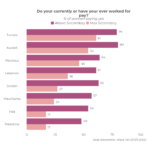Religion informs political attitudes and hence is consequential for understanding political beliefs and preferences. This is especially true for the Middle East and North Africa (MENA) where religion is a formidable social force, ranging from its influence on the Arab Spring, various civil wars, the failure of democratization, and responses to COVID-19. Islam, especially, factors prominently in social, political, and economic life in MENA societies.
Typically, personal religiosity is taken as the central marker of religion in empirical studies. Students of religion and politics in MENA have increasingly exploited the burgeoning public opinion data and used survey items tapping self-reported devotion, belief in various aspects of doctrine, and religious attendance, among others, to measure this concept. Arab Barometer surveys, for example, are valuable resources that allow researchers to measure various dimensions of Muslim religiosity and test religion’s effects on political attitudes. Using these data, researchers have developed sophisticated explanations concerning the interplay of religiosity and political attitudes, including those related to democracy, Islamism, economic development, and international actors. Despite these advances, no agreement exists about measurement of religiosity – the conceptual boundaries and statistical validity of religiosity as a central variable remains ambiguous. It is necessary to cross-validate survey-based measurement strategies with external data other than the public opinion surveys to increase clarity to the field.
*This essay is based on the following article: Ciftci, Sabri, Michael Robbins, and Sofya Zaytseva. “Devotion at Sub-National Level: Ramadan, Nighttime Lights, and Religiosity in the Egyptian Governorates.” International Journal of Public Opinion Research (2020).
To view the full blog post, click on the link below:
Click to view complete blog post


